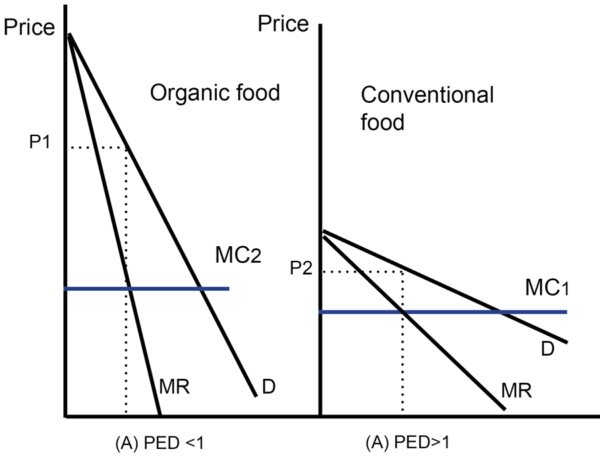Organic food is increasingly popular. In the UK, sales of organic food and drink is worth £1.96bn. But organic food still has only 1.4% share of the food and drink market (Soil Association) – with higher prices discouraging many shoppers.
Organic food also attracts a hefty premium over non-organic food. In 2016, in the US, a survey by USDA found the organic premium varied from 7% for fresh spinach to 82% for eggs. In the UK, the organic premium is higher. Shoppers pay on average an organic premium of 89%.
- Carrots and broccoli had the largest difference – with a kilo of organic carrots £1.40, compared to just 46p for non-organic.
- Organic free-range eggs had the highest premium at 112%
- Organic coffee was the lowest premium at 28%. (Food Navigators)
What are the reasons for higher prices of organic food?
- Higher costs of producing organic food
- Bigger profit-markup by retailers.
- An element of price discrimination – supermarkets charging higher prices to consumers with more inelastic demand (similar to first-class tickets)
- Demand rising faster than supply
Higher cost of producing organic food. Organic food does not allow the use of artificial fertilisers and pesticides. Therefore, farmers may have to rely on more labour-intensive methods of weed control/pest control. More crops may be lost due to disease pest, so the output is lower than conventional products.
Bigger profit margin for organics
Organic farmers often claim that the large price differentials are not matched by the price they receive. In other words, supermarkets take advantage of the organic ‘premium’ label to put a bigger markup on price. A study by French consumer association UFC-Que Choisir found that organic products were 93% more expensive in France But “Only half of the price difference between organic and non-organic food finds its way back to farmers.
An element of price discrimination. It is not true price discrimination because organic food is a different product to non-organic food. But, there is an element of taking advantage of different elasticities – with supermarkets charging higher prices to those willing to buy the more expensive organic food. Those who buy organic food are more likely to have higher disposable incomes and have more inelastic demand for food. Organic food is a luxury good. As income increases, consumers are willing to spend a bigger percentage of income on organic rather than conventional.

Demand rising faster than supply
The demand for organic food is growing faster than the supply of organic food. Despite farms converting to organic production the increase in supply is less than the rapid rise in demand. One issue is that converting to organic can be a long process – three years to gain a full certificate. This can discourage farmers from making the investment when future revenues are uncertain. With demand rising faster than supply, it is to be unexpected the market mechanism will push up prices
It’s also important to note that you don’t need to buy all foods organic. The Environmental Working Group’s Shopper’s Guide to Pesticides has a "Clean 15" list of the 15 types of produce lowest in pesticides. Save your money for the other organic produce and buy the conventional versions of these:
- Onions
- Sweet corn
- Pineapples
- Avocado
- Asparagus
- Sweet peas
- Mangoes
- Eggplant
- Cantaloupe — domestic
- Kiwi
- Cabbage
- Watermelon
- Sweet potatoes
- Grapefruit
- Mushroom
So at the end of the day it seems there are some supermarkets that are overpricing the organic food because they can get away with it.
Here on Menorca there are shops which are not too expensive, one of them is the granel shop I mentioned in a previous blog. Here are some photos to remind you!
The blog song for today is: "20th Century Boy" by T Rex
TTFN






No comments:
Post a Comment